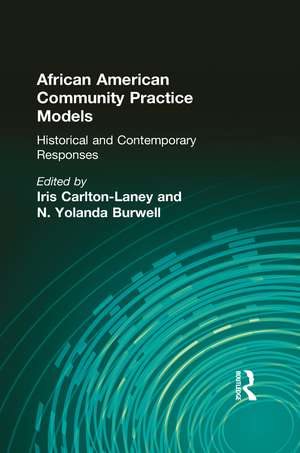African American Community Practice Models: Historical and Contemporary Responses
Autor Iris Carlton-Laney, N Yolanda Burwellen Limba Engleză Paperback – 26 oct 2016
The contributing authors use a new lens for understanding social welfare history and social service development. They encourage social workers to explore new model-building and to pursue new knowledge about African Americans in the social work classroom. In addition to tracing the history of community development, African American Community Practice Models specifically:
- presents the black community from a position of strength and leadership
- documents leadership in the black community to ground national advocacy organizations
- traces women’s leadership in community development
- documents the unrecognized history of African Americans in the development of the Settlement Movement
- highlights examples of current self-help programs sponsored by African American communities to change negative behavior patterns
- documents the impact of racism on service delivery and the response to develop community support programs
- presents a challenge to expand community development for both internal and external advocacy
Professors of the core courses in social work--HBSE, research, policy, and practice--and of specialized courses in community practice, macropractice, and African Americans would benefit from teaching from African American Community Practice Models. Students and faculty in these and other study areas concerned with this community will get community tactics and program development ideas from this book that connect with African American people. The importance of community development from within the African American community, historical and current methods of dealing with the ongoing impact of racism and economic disadvantage, the responsibility of professionals and community leaders to build empowerment strategies within African American communities, and the need to advocate for rights and opportunities in larger society for black Americans are key issues addressed throughout the book, which begins to fill the void of positive presentations of black community development.
Preț: 208.75 lei
Nou
Puncte Express: 313
Preț estimativ în valută:
39.95€ • 41.55$ • 32.98£
39.95€ • 41.55$ • 32.98£
Carte tipărită la comandă
Livrare economică 14-28 aprilie
Preluare comenzi: 021 569.72.76
Specificații
ISBN-13: 9781138966253
ISBN-10: 1138966258
Pagini: 130
Dimensiuni: 152 x 229 x 7 mm
Greutate: 0.23 kg
Ediția:1
Editura: Taylor & Francis
Colecția Routledge
Locul publicării:Oxford, United Kingdom
ISBN-10: 1138966258
Pagini: 130
Dimensiuni: 152 x 229 x 7 mm
Greutate: 0.23 kg
Ediția:1
Editura: Taylor & Francis
Colecția Routledge
Locul publicării:Oxford, United Kingdom
Cuprins
ContentsIntroduction: Social Work’s Historical and Contemporary Responses to African Americans Through Community Practice
- Urban African American Community Development in the Progressive Era
- George and Birdye Haynes’ Legacy to Community Practice
- Lawrence Oxley and Locality Development: Black Self-Help in North Carolina 1925–1928
- HIV/AIDS Prevention in the African American Community: An Integrated Community-Based Practice Approach
- Redirecting the Lives of Urban Black Males: An Assessment of Milwaukee’s Midnight Basketball League
- Index
- Reference Notes Included
Descriere
African American Community Practice Models shows you what you can “see” and “learn” when people of African American descent are put in the center of community analysis and change. This text celebrates African American experiences and challenges you to understand the black experience from the inside out rather than from the outside in. The contributors provide excellent historical and current case studies of leaders and programs that provide you with models for program and community development in African American communities today. For the contemporary social worker, these historical comparisons reveal what strategies have been needed in African American communities in the past because of political and social climates. The studies of current successful programs instruct those in community-based African American programs, general service networks, and students on how to continue to better serve the black community.









